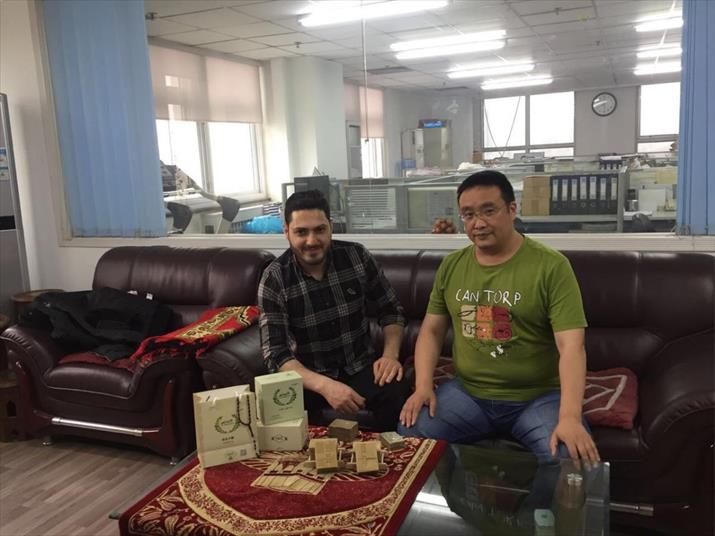| Business |
| Treading New Ground | |
| A Chinese entrepreneur explores business opportunities in Middle Eastern countries | |
|
|
 Li Jianwei (right) meets with a chef from Syria in his office in Tianjin (COURTESY PHOTO)
With the focus on the turmoil in Syria, few are concerned about whether business in the once prosperous but now war-torn country is still ongoing. Li Jianwei, a businessman from China, set out to answer this question. Engaged in business with Middle Eastern countries for many years, Li, who speaks fluent English and Arabic, now sells Aleppo's famous olive soap in China.
In high demand Located between the Euphrates River and the Mediterranean, Aleppo, the second largest city in Syria, was famous for its industry and commerce. During the Ottoman Empire period (1299-1922), it was once the largest trading center in the Near East. Among the numerous locally produced industrial and agricultural products, Aleppo's handmade olive soap is world-famous for the quality of the materials used and the excellent workmanship. Li came across the soap while doing business in the Middle East, and thought of importing it to China. "I started importing Aleppo olive soap two years ago. Since I often visit the Middle East, I have used it frequently, and local friends also present the soap to me," said Li. "The olive soap is made of purely natural ingredients without any chemical additives, artificial essences or coloring agents. I feel the soap is very good for moisturizing." Li is confident the soap will be in high demand in China. According to him, China's cosmetics market is growing rapidly, and there is strong demand for different kinds of products in different price ranges. Moreover, it has become a trend for consumers to buy quality natural products. Imported handmade olive soap is a little more expensive than other soaps, but will be well received by young consumers, Li said. In recent years, olive soap has become increasingly popular with Chinese consumers, and some are even collecting old olive soap. Li sells the soap under the brand of Al Andalus through his online shops and it has been well accepted. Now he is preparing to sell it through Wal-Mart shops. However, Li has found that counterfeit and inferior Aleppo soap has emerged in the market, stimulated by the huge demand. He has collected many pieces of the fake soap to warn consumers. Li said olive soap can be found in many Middle Eastern countries that he visits, but he imports soap produced in Syria only. The producer he has selected is a long-established handmade olive factory in Syria, and every year he imports 1 million yuan ($147,059) worth of soap from the factory. The supplier Li works with is a large family firm engaged in handmade olive soap production since the 1950s, whose products have been sold in Germany and other European countries. Before the war in Syria, the factory had to hire additional workers during the olive-picking season in order to finish the large number of orders. But the war-torn city no longer sees such rush. There used to be nearly 1,000 olive soap workshops in Aleppo before the war, but now most of them have fled. Many moved to Tartus which is 80 km away from Aleppo. Li said the losses are obvious. Many traditional molds could not be taken away when people fled, so now some production steps have to be completed by machines. Despite the war, Li's orders have never been delayed. "My soap is transported by containers from the Port of Latakia in Syria to China's Tianjin Port in 28 to 35 days, and cargo freight has been normal and not affected by the war," said Li. He plans to build a museum in Tianjin on Aleppo's traditional soap production. He said, "When the situation in Syria becomes stable, I plan to return there to look for some production tools in old factories. Soap production is part of local people's history, but most of the factories are destroyed now. I aim to demonstrate how the soap is produced and the cultural essence of its production in my museum."
Traditional olive soap production in Aleppo (COURTESY PHOTO)
Arabian adventures Li is mainly engaged in producing and selling Arabian men's clothing, and his clients are from Saudi Arabia, Kuwait, Yemen and Syria. He has set up factories in China. In recent years, he also started to produce and export Arabian women's clothing. Each year, he exports around $15 million worth of clothing. Li also imports many products. In 2016, he imported carpets from Turkey and sold them in northeast China. He said Turkish carpets are selling well in China. He is now planning to set up a shop in China to sell Yemeni honey, Iranian saffron and other food products. Since graduating from the Arabic language department of Beijing Foreign Studies University in 1994, Li has had dealings with Middle Eastern countries for more than 20 years. He said he chose to major in Arabic because he was fascinated by Tales From a Thousand and One Nights. Li also thinks Arabian cuisine is very healthy and wants to introduce it in China by opening an Arabian restaurant in Tianjin. He has hired a chef from Syria. Despite his business with the Middle East, Li has not visited Syria for years because of the war. "After the war is over, I will certainly go to Aleppo again," he said. The author is a senior editor with China Today Copyedited by Bryan Michael Galvan Comments to zhouxiaoyan@bjreview.com |
|
||||||||||||||||||||||||||||||
|
